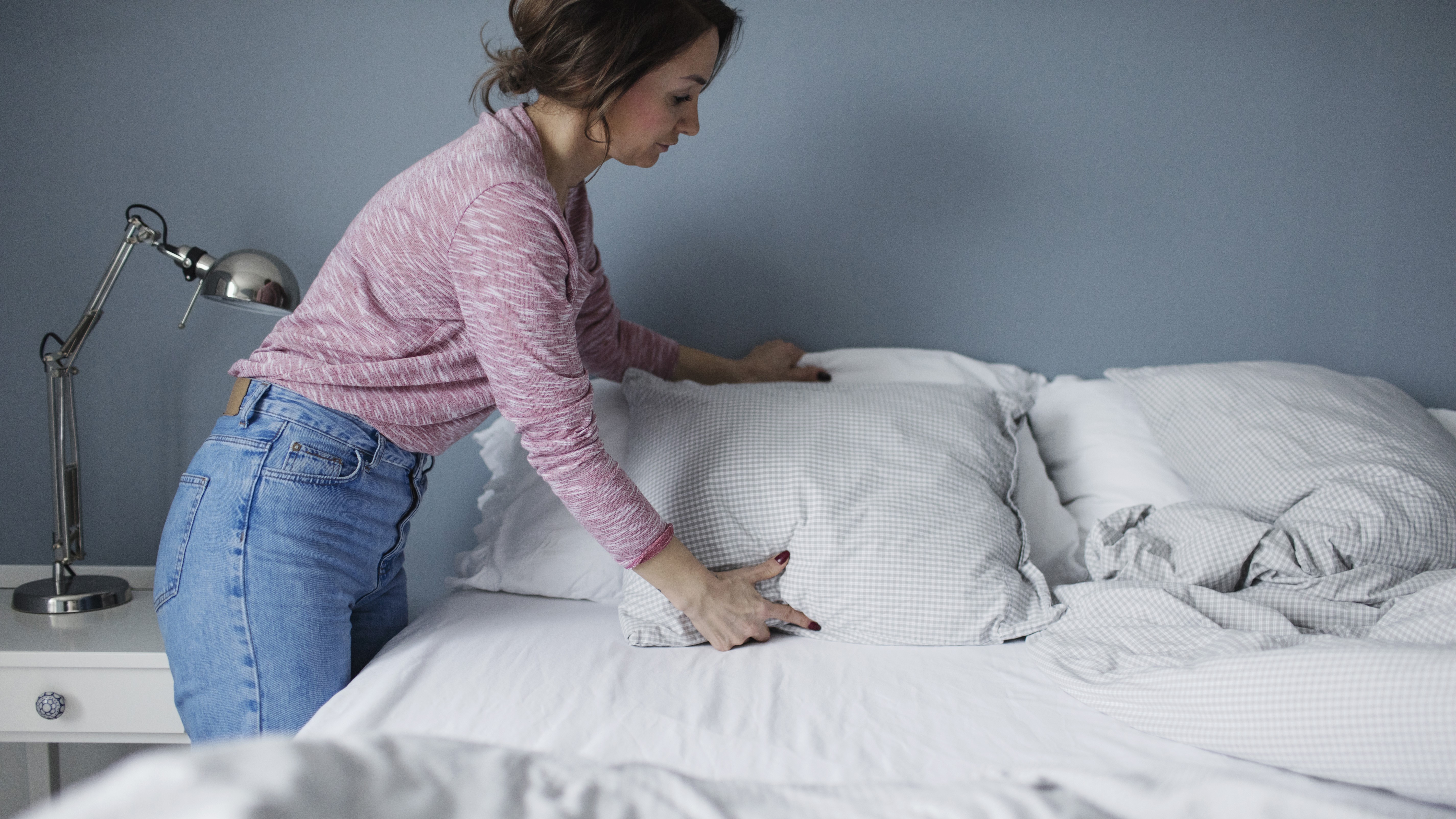Why can't I sleep? An expert reveals what could be keeping you awake at night
If you're lying in bed wondering 'why can't I sleep?', you're not alone. Here's what you can do about sleepless nights

If you find yourself lying awake, wondering ‘why can’t I sleep?’ you’re not alone.
While sleep is an essential part of good health, it doesn’t always come easy, even if you have the best pillow to snooze on. 'Why can't I sleep?' is one of the most searched questions online, along with the likes of 'why does my pee smell?', 'what's causing my tongue pain?', and 'why am I waking up at the same time every night?'.
In the US, research by the Perelman School of Medicine found that 1 in 4 adults experience acute insomnia every year, and struggle to fall asleep or regularly wake up during the night.
According to the Sleep Foundation, an irregular sleep schedule, poor sleep hygiene, mental health disorders like anxiety and depression, physical illnesses and pain, medications, and specific sleep disorders could also be the reason you can’t sleep at night.
We've all been there, at 3 am wide-awake wondering 'why can't I sleep?', but the good news is, the five most common causes of disrupted sleep can be addressed and you can make sleepless nights a thing of the past.
1. Stress
Unsurprisingly, stress could be the reason you're wondering 'why can't I sleep?' and is often one of the main causes of common nightmares. BWRT psychotherapist Laura McDonald says you may not even realize you're stressed about something, but it could be there on an unconscious level and keep you awake at night.
You might be struggling to fall asleep, waking up in the night, or feeling even more exhausted when you wake up the next day, and this can be caused by all different types of stress, including chronic stress, such as post-traumatic stress disorder and short-term, day-to-day stress.
Sign up for the woman&home newsletter
Sign up to our free daily email for the latest royal and entertainment news, interesting opinion, expert advice on styling and beauty trends, and no-nonsense guides to the health and wellness questions you want answered.
Research shows some of us could be more vulnerable to stress-induced sleeping problems and are considered to have high sleep reactivity, where mental and physical stresses cause disrupted sleep.
In this case, Laura suggests therapy could be an effective way of treating stress for better sleep.
“Therapy can be highly effective for treating insomnia. They may include ‘talking therapies such as cognitive-behavioral therapy (CBT) which can help change your behavior before bedtime. There are also newer therapies which can act quicker such as brain working recursive therapy (BWRT) which helps change your mind and body’s approach to sleeping.’
This could be particularly helpful if you develop sleep anxiety due to your irregular sleep routine.
2. Medical conditions
A known or underlying medical condition could also be the cause of your sleep problems, as could any medication you’re taking.
Laura advises getting in touch with your doctor if you have ruled out the other common causes of disrupted sleep and are concerned it could be down to a medical condition.
“The first thing I say to anyone getting in touch with me regarding sleep (or lack of it) is to visit their doctor. Some instances of insomnia may have an underlying medical reason, even something as simple as a vitamin deficiency, and if this is the case, your doctor will be able to help,” Laura says.
“It could also be caused by a medication you may be already taking. It could be related to a weight issue, or sleep apnoea, and in these cases, it will be those issues that are dealt with by a doctor.”

3. Poor diet
If that niggling 'Why can't I sleep?' question is still ringing in your mind, it's time to look at your diet.
“Address your diet—do you need to cut back on sugary foods and drinks?” Laura says, “A qualified nutritional therapist can offer you the best advice in this instance. They can also advise you as to whether you could benefit from supplements for sleep; for example, magnesium is a key nutrient for sleep support, in glycinate form and could be worth incorporating into your diet.”
There are also foods you can incorporate into your diet that will help you snooze. Bananas are rich in magnesium, turkey contains tryptophan that encourages sleep, and almonds contain both tryptophan and magnesium, which help reduce muscle and nerve function and steady your heart rhythm for a night of rest.
You should also make sure your rule out heavy carb-filled meals, alcohol, and caffeine too close to bedtime. Instead, swap an evening cup of caffeinated tea for sleep tea.
4. Poor sleep hygiene
A bedtime routine that doesn’t involve lots of rest and relaxation is a sure-fire way to a restless night. Give yourself a few hours before bed to get your body and mind ready for sleep by having a warm shower or bath, doing some light bedtime yoga or listening to sleep-guided meditations.
You should also consider if you're using tech too close to bedtime, as this can keep you awake for longer at night.
While our smartphones are great for keeping us informed and entertained, when it comes to lights out the last thing our brain needs is stimulation. What’s more, the blue light emitted from our devices halts the natural production of melatonin, the sleep hormone that controls our sleep-wake cycle, and could be the reason you find yourself lying awake for hours.
Limit your screen time in the evening your screen time when you get into bed, and instead practice gratitude.
“Notice the gentle energy that the darkness of the night brings. Notice how smooth your breathing is. Notice how lovely it is to let go completely, relaxing all the muscles, as you feel completely supported by your bed," Laura says.
She adds, "You can also do this if you wake up during the night. Instead of trying desperately to fall back to sleep, just notice how lovely it is to be warm, still, and have nothing to do."
Instead of lying there wondering why you can't sleep, Laura suggests changing the narrative to focus on the positives instead.

5. A messy sleep environment
Many of us don’t realize how important a clean and tidy space is to help us sleep well. Being surrounded by clutter can cause stress, whether we realize it or not, and wreak havoc with our sleep.
Naturally, you’ll struggle to sleep if you’re getting into bed surrounded by mess. Spend a few minutes in the evening tidying up your space, put away laundry, if you work from home make sure to clear your workspace, make your bed, fluff up your pillows, and make sure your room is at the optimal temperature of 16-18C to allow your body to release the melatonin it needs for sleep.
You could also invest in the best pillow for your sleeping position, and if you suffer from neck pain or lower back pain, make sure to choose a pillow that’s comfortable and supportive for you.
Hattie Gladwell is a 25-year-old journalist and editor who’s passionate about mental health and wellbeing, sex and relationships.
-
 Smeg's retro hand mixer puts the 'king' in baking - I'm convinced it's the best
Smeg's retro hand mixer puts the 'king' in baking - I'm convinced it's the bestThe Smeg 50s Style Hand Mixer is every keen baker's dream: it whips up cream, mixes cookie dough, and kneads bread like the best hand mixers on the market
By Laura Honey Published
-
 From highlights to glosses, here's everything you should know before colouring Afro-textured hair
From highlights to glosses, here's everything you should know before colouring Afro-textured hairKeep your curls and coils healthy during colour processes with this beauty editor's guide
By Keeks Reid Published